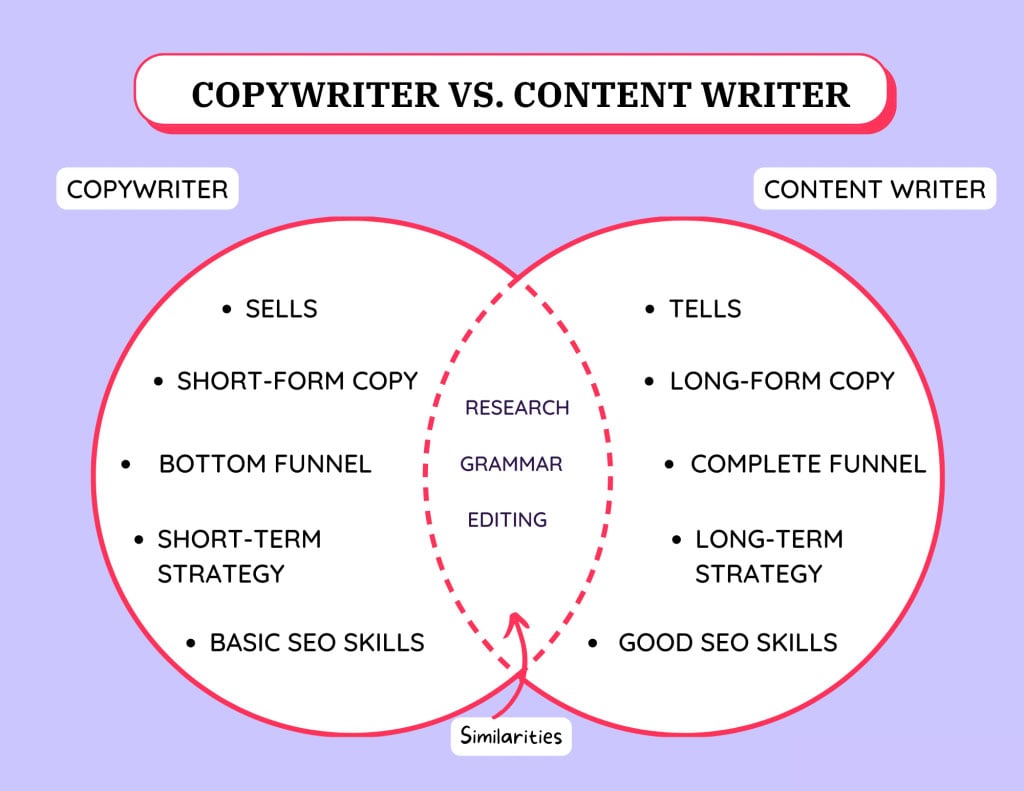Copywriting and content writing are two different but essential elements of digital marketing. Despite sounding similar, the differences between the two are significant, and understanding these differences is critical to the success of your online marketing efforts.
Copywriting is often associated with advertising and sales, while content writing is more focused on providing informative and engaging content to your audience. In this blog post, we will explore the difference between copywriting and content writing and why they are both essential to your marketing strategy.
What is Copywriting?
Copywriting is the art of writing persuasive and compelling marketing copy to promote a product, service, or brand. The primary goal of copywriting is to sell, and copywriters are often tasked with creating content that drives conversions, such as product descriptions, sales pages, email campaigns, and ad copy.
Copywriting is a highly skilled profession that requires the ability to communicate a brand’s message effectively while creating an emotional connection with the target audience. Copywriters must understand the psychology of consumer behavior and use language that resonates with their audience.
Copywriting can take many forms, such as direct response marketing, email marketing, social media marketing, and search engine marketing. The goal is always to persuade the audience to take a specific action, such as buying a product, signing up for a newsletter, or making a phone call.
What is Content Writing?
Content writing is the process of creating informative and engaging content that provides value to your target audience. The primary goal of content writing is to educate and entertain the audience, not to sell directly.
Content writing is an essential part of inbound marketing, which focuses on attracting and engaging potential customers through quality content. Content writers create blog posts, articles, white papers, e-books, and other types of content that address the pain points and needs of the target audience.
The goal of content writing is to build trust and authority with the audience by providing valuable information that solves their problems. Content writers must understand the target audience’s interests and preferences to create content that resonates with them.
Content writing can help drive traffic to a website, increase brand awareness, and establish a company as a thought leader in its industry. By providing valuable content, companies can attract potential customers and build long-term relationships with them.
Key Differences Between Copywriting and Content Writing
The primary difference between copywriting and content writing is the purpose of the content. Copywriting is focused on selling and promoting a product, while content writing is focused on providing value to the audience.
Copywriting is often shorter and more concise than content writing, as it needs to grab the audience’s attention quickly and persuade them to take action. Content writing, on the other hand, can be longer and more in-depth, as it aims to provide value to the audience and establish a company as a thought leader in its industry.
Copywriting is often used in direct response marketing, while content writing is used in inbound marketing. Direct response marketing aims to generate an immediate response from the audience, while inbound marketing aims to attract potential customers and build long-term relationships with them.
Which One is More Important?
Both copywriting and content writing are essential to a successful digital marketing strategy. Copywriting is crucial for driving conversions and sales, while content writing is crucial for building trust and authority with the audience.
Companies that only focus on copywriting without providing valuable content to their audience will struggle to build long-term relationships with their customers. Similarly, companies that only focus on content writing without using persuasive language and call to action will struggle to drive conversions and sales.
The key is to find the right balance between copywriting and content writing and use them both strategically to achieve your marketing goals. By combining the persuasive power of copywriting with the informative value of content writing, you can create a marketing strategy that drives both short-term and long-term results.
Conclusion
Copywriting and content writing are two different but equally important aspects of digital marketing. Copywriting focuses on selling and persuading the audience to take action, while content writing focuses on providing valuable information to build trust and authority with the audience.
To have a successful digital marketing strategy, businesses need to use both copywriting and content writing effectively. By finding the right balance between the two, businesses can drive conversions, build long-term relationships with customers, and establish themselves as thought leaders in their industry.
In conclusion, copywriting and content writing are not interchangeable terms, and understanding the differences between the two is critical to creating an effective digital marketing strategy. By using both types of writing strategically, businesses can achieve their marketing goals and grow their online presence.
